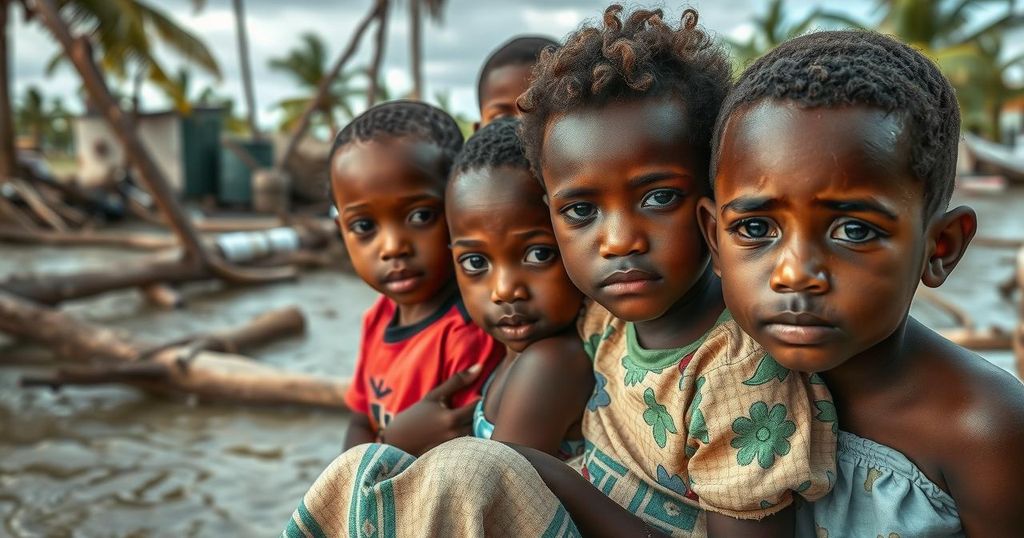Cyclone Chido Hits Mozambique, Endangering Thousands of Children and Communities
Tropical Cyclone Chido devastated northern Mozambique, impacting 90,000 children and destroying 35,000 homes. The cyclone affected educational and health infrastructure while exacerbating existing humanitarian challenges in a region already in crisis due to prolonged conflict and disease outbreaks, prompting urgent emergency responses from UN agencies.
Tropical Cyclone Chido has wreaked havoc on northern Mozambique, significantly impacting approximately 90,000 children, as reported by UNICEF. The cyclone made landfall in Cabo Delgado province, resulting in over 35,000 homes being either destroyed or damaged, and displacing thousands of families. The storm’s aftermath is widespread, affecting not only residential structures but also decimating educational facilities and health infrastructure, with assessments indicating that at least 186 classrooms and 20 health facilities were destroyed.
The cyclone struck near Pemba, causing considerable damage to civilian infrastructure, including electricity and communication systems. Mary Louise Eagleton, UNICEF Representative in Mozambique, stated, “Mozambique is considered one of the most affected countries in the world by climate change,” emphasizing that children were already facing life-threatening situations due to ongoing conflicts, droughts, and disease outbreaks before Chido struck.
The storm’s impact has heightened humanitarian crises in Cabo Delgado, a province already suffering from seven years of conflict, which has internally displaced over 1.3 million people, predominantly women and children. It was reported that the cyclone also affected Nampula and Niassa provinces, complicating the existing cholera outbreak and necessitating urgent health assessments by WHO experts deployed in the region.
UN agencies, alongside local and governmental partners, have initiated emergency responses. Within the first 48 hours, UNHCR delivered aid to Pemba, providing essential supplies, including blankets and emergency shelters to over 2,600 impacted individuals. Preliminary assessments reveal that around 190,000 people urgently require humanitarian assistance, with extensive damage reported across rural communities.
António Guterres, the UN Secretary-General, stated through a social media post that UN teams are actively engaged in providing emergency support and remain poised to offer additional assistance as needed. Meanwhile, OCHA has committed $4 million towards the early humanitarian response, amidst projections that as many as 3.3 million people in Mozambique may face crisis levels of food insecurity next year due to the combined impacts of the cyclone and ongoing socio-economic challenges.
Moreover, Cyclone Chido has caused significant devastation in Mayotte, a French overseas territory, resulting in fatalities and grave risks for vulnerable communities, including refugees. In southern Malawi, the cyclone also led to destructive winds and rains, highlighting the widespread impact of this natural disaster across multiple regions.
UN agencies are working diligently to mitigate the adverse effects of Cyclone Chido and provide necessary support to affected populations, navigating the complexities exacerbated by previous emergencies.
Cyclone Chido has emerged as a significant natural disaster affecting northern Mozambique, particularly capturing attention due to its disastrous impacts on vulnerable populations, especially children. Mozambique is among the nations most adversely impacted by climate change, frequently experiencing severe weather conditions that exacerbate existing humanitarian crises. The province of Cabo Delgado, where the cyclone made landfall, has been plagued by long-term conflict, contributing to widespread displacement and pre-existing conditions of instability that heighten the effects of such natural disasters.
In summary, Tropical Cyclone Chido has inflicted considerable damage in northern Mozambique, with UNICEF reporting around 90,000 children affected. The cyclone has destroyed vital infrastructure, displacing families and compounding existing humanitarian crises, including an active cholera outbreak. UN agencies are mobilizing to provide emergency assistance, but challenges persist due to limited resources. This disaster highlights Mozambique’s vulnerability to climate impacts, further underscoring the need for comprehensive humanitarian responses.
Original Source: news.un.org




Post Comment